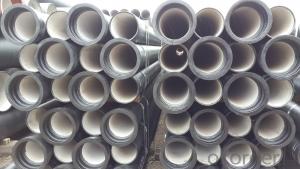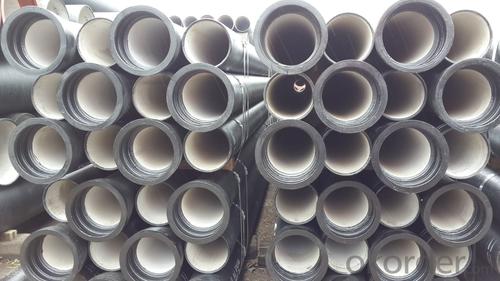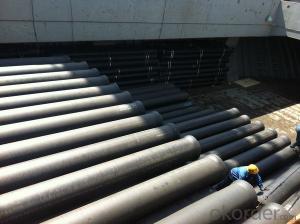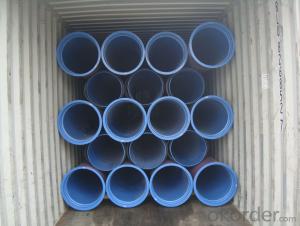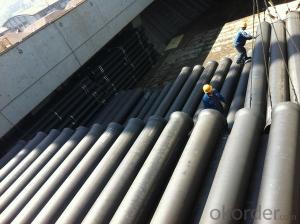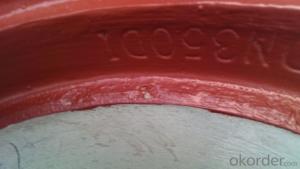T Type Ductile Iron Pipe DN1200 socket spigot pipes
- Loading Port:
- Tianjin
- Payment Terms:
- TT OR LC
- Min Order Qty:
- 25 m
- Supply Capability:
- 30000 m/month
OKorder Service Pledge
OKorder Financial Service
You Might Also Like
1) The standard of pipe: ISO2531:1998, EN545:2006,K9 K8
2) Effective length: 6m/5.7m
3) Inner cement line: Portland cement lineas per ISO4179
4) Zinc coating: at least 130g/m2 as per ISO8179
5) Bitumen painting: at least 70μm as per ISO8179
6)With 102% quantity of NBR, SBR, or EPDM ring asper ISO4633
7) DN80-DN1200
8) Highstrength, lighter than grey iron, good corrosion resistance, no furring, smallflow resistance, easy fixing, long life tome about 100 yeas
9)Checked by automatic inspection equipment
10) Composition:
Chemical composition | |||
Chemical composition | Ductile Cast Iron Pipe (%) | Grey iron pipe (%) | Steel pipe (%) |
C | 3.5-4.0 | 3.2-3.8 | 0.1-0.2 |
Si | 1.9-2.6 | 1.4-2.2 | 0.15-0.4 |
Mn | 0.15-0.45 | 0.4-0.6 | 0.3-0.6 |
P | ≤0.06 | ≤0.3 | 0.02-0.03 |
S | ≤0.02 | ≤0.1 | 0.02-0.03 |
Mg | 0.03-0.06 |
|
|
11) Feature:
Mechanical properties | |||
| Ductile Cast Iron Pipe | Grey Iron Pipe | Steel Pipe |
Tensile Strength(Mpa) | ≥420 | 150-260 | ≥400 |
Yield Strength(Mpa) | ≥300 | No Confirmation | No Confirmation |
Bending Strength(Mpa) | ≥590 | 200-360 | ≥400 |
Elongation (%) | ≥10 | Neglected | ≥18 |
Brinell Hardness(HBS) | ≤230 | ≤230 | About 140 |
12) T type mechanical joint
13) Packing: in bulk or container
PACKING: 1) Pipesare bundled together with the steel belt.
2) Wooden pieces are put between the pipes.
- Q: Are ductile iron pipes suitable for use in irrigation gate systems?
- Indeed, irrigation gate systems can benefit from the use of ductile iron pipes. Ductile iron, a variant of cast iron, boasts superior strength and flexibility, rendering it a reliable and long-lasting option for applications like irrigation gate systems. Ductile iron pipes are famed for their remarkable tensile strength and resistance to corrosion, features that are crucial for preserving the integrity of the irrigation system. Moreover, these pipes can endure high pressure and offer an extended lifespan, making them a cost-efficient solution for irrigation gate systems. In summary, the strength, durability, and corrosion resistance of ductile iron pipes make them highly suitable for use in irrigation gate systems.
- Q: What is the acceptance of cast iron pipe material?
- Specific acceptance, first of all in line with national standards, followed by the provisions of the contract, and then the project requirements. General contract and drawings will have the requirements and standards of pipe. I hope I can help you.
- Q: What is the expected pressure rating of ductile iron pipes?
- The pressure rating of ductile iron pipes can vary depending on factors like pipe diameter, wall thickness, and installation joint type. However, ductile iron pipes are generally recognized for their durability and ability to handle high pressure. In most instances, ductile iron pipes are designed and produced to meet or surpass industry standards like AWWA C151 or C115/A21.15. These standards establish the minimum pressure rating for ductile iron pipes, which typically range from 150 to 350 psi for water transmission purposes. It's important to note that the pressure rating is also influenced by the pipe's class, which corresponds to the wall thickness. Ductile iron pipes are commonly available in different classes such as Class 50, Class 51, Class 52, etc. Each class has its own pressure rating, with higher classes offering greater strength and pressure resistance. To determine the exact pressure rating, it is advisable to refer to the manufacturer's specifications and guidelines for the specific ductile iron pipes being used. Additionally, other factors like pipe support, installation methods, and operating conditions should be considered to ensure the safe and efficient functioning of the ductile iron pipe system.
- Q: Are ductile iron pipes available for cutting and are there any relevant specifications?
- Can be cut, the specification is based on the original specification, just for some engineering needs
- Q: Ductile iron gears are generally treated without heat treatment
- The mechanical properties of ductile iron are equivalent to quenched and tempered steel. The gears made of ductile iron can be quenched or tempered by high temperature + surface quenching, that is, quenching and tempering treatment + surface hardening.
- Q: If the ductile iron pipe is broken, can we use rush repair?
- In this way, manpower, material resources and financial resources can be saved, time can be saved, and unnecessary troubles to the citizens' water supply can also be reduced.
- Q: Can ductile iron pipes be used for fire protection systems?
- Yes, ductile iron pipes can be used for fire protection systems. Ductile iron is a type of cast iron that exhibits high strength and flexibility, making it suitable for a wide range of applications, including fire protection systems. It has excellent mechanical properties, including high tensile strength and impact resistance, which are important factors for withstanding the high pressures and stresses that can occur during fire suppression efforts. Ductile iron pipes are known for their durability and longevity, which is crucial for fire protection systems that need to be reliable and functional for extended periods of time. They have a longer lifespan compared to other materials, such as PVC or galvanized steel, and are less prone to corrosion, which is especially important for fire protection systems as they need to remain operational even after long periods of inactivity. Furthermore, ductile iron pipes have excellent fire resistance properties. They can withstand high temperatures without losing their structural integrity, ensuring that the fire protection system remains intact and functional during a fire emergency. This is crucial for ensuring the safety of occupants and minimizing property damage. In addition to their mechanical and fire-resistant properties, ductile iron pipes are also compatible with various types of fittings, valves, and accessories commonly used in fire protection systems. This allows for easy installation and integration into existing fire suppression networks. Overall, ductile iron pipes are a reliable and suitable choice for fire protection systems due to their high strength, durability, fire resistance, and compatibility with other system components.
- Q: Method for cutting large diameter ductile iron pipe
- When the oxygen and acetylene volume ratio is greater than 1.2, is formed. As more oxygen, burning, the flame length is shortened obviously, cone tapered inner flame almost disappeared, and a strong desire. Making due to oxygen, the oxidation of metal, so are not widely used, only used for welding of brass, to prevent evaporation of zinc.
- Q: How do ductile iron pipes compare to PVC pipes?
- Ductile iron pipes are generally stronger and more durable compared to PVC pipes. They have a higher tensile strength and can withstand higher pressure, making them suitable for more demanding applications such as water mains and sewer lines. PVC pipes, on the other hand, are lightweight, easy to install, and resistant to corrosion, making them a popular choice for household plumbing and irrigation systems. Ultimately, the choice between ductile iron and PVC pipes depends on the specific needs and requirements of the project.
- Q: Do ductile iron pipes have inner enamel?
- For fire water and living water supply, low requirement is lined with cement mortar, some high can be lined with epoxy resin, epoxy ceramic lining, as well as cement mortar lining epoxy sealing layer (compromise is the price of blame).
Send your message to us
T Type Ductile Iron Pipe DN1200 socket spigot pipes
- Loading Port:
- Tianjin
- Payment Terms:
- TT OR LC
- Min Order Qty:
- 25 m
- Supply Capability:
- 30000 m/month
OKorder Service Pledge
OKorder Financial Service
Similar products
Hot products
Hot Searches
Related keywords
